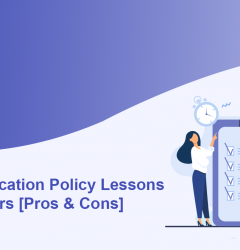18 Jul

Did you know? According to an Interact poll, 69% of managers frequently feel uncomfortable speaking with their employees, and 37% are uncomfortable giving direct comments about their employees’ performance if they believe the employee would react negatively to the input.
Whenever we discuss the core of a company, we always refer to its workforce. However, it is essential to remember that managers are just as important as employees in terms of organizational performance.
Managers have a significant role in a company, which takes us to our core issue of manager effectiveness. When management effectively completes its aims, an increase in positive results and improved internal metrics is conceivable. Furthermore, their caring personality, welcoming demeanor, and humility towards their staff have all played an important part.
In this blog, we will talk about what is manager effectiveness. Why is manager effectiveness important? What can we do to improve manager effectiveness in our organization? And a lot more, so let’s get ready to learn about manager effectiveness.
Table of Contents
What is Manager Effectiveness?
Manager effectiveness can refer to achieving organizational goals, increasing production, revenue, employee satisfaction, progress, development, and so on. Manager effectiveness aims at maximizing the administration and utilization of limited company assets in order to accomplish goals at the lowest possible cost. Its goal is to get the most out of the least amount of input.
Effective managers maintain the company running in the now and the future. An organization must be capable of future performance, development, and change. An organization that does not plan for the future has wrecked assets, that is, capital that is insufficient to generate money for its existence. Managerial effectiveness seeks to ensure an organization’s survival, development, and adaptation to its external environment.
Why is Manager Effectiveness Important?
The corporate culture has shifted significantly. Current international leaders tend to give their employees more independence in order to increase productivity. This has also opened up the opportunity for managers to examine and enhance their managing abilities in order to achieve success.
Increasing manager effectiveness is now important for firms. But first, we should understand how important it is to its long-term performance and survival.
1. Turnover Rates
Understanding the wants and expectations of employees boosts managers’ reputations as excellent managers, lowering turnover rates in the long term. Furthermore, indicating how the manager efficiently tackles critical issues for the organization’s performance.
2. Overall organizational Growth
As manager effectiveness improves, business growth accelerates. It is feasible to assist managers in controlling their respective areas by using their experience as well as how they manage situations. Another important element is that a manager links the tasks of the teams with the aims and objectives of the firm.
3. Revolutionary Changes
The continually changing world necessitates periodic changes in company structures. Manager effectiveness gives accurate and useful information to assist teams in quickly adapting to the new arrangement.
4. Decent Productivity
Manager effectiveness is closely tied to employee happiness and performance. When managers respond to their employees’ concerns and strive to address them, it improves their current effectiveness.
Tips for Increasing Manager Effectiveness
Developing a diverse set of talents and characteristics is required to become a successful manager. Here are some suggestions to help you increase your manager’s effectiveness:
1. Set objectives
Setting clear goals for your staff to aim towards is another strategy for increasing your effectiveness as a manager. You should utilize the SMART technique to help your staff develop amazing objectives such as:
- Specific: The goals you set for your staff should be clear and specific so that they may be readily understood.
- Measurable: These goals are vital because they allow you to utilize metrics to track your employees’ progress toward reaching them.
- Attainable: Set objectives that your staff can achieve so that they are not overwhelmed or discouraged by unreasonable expectations.
- Relevant: You may set goals for your staff that is related to the general aims of your firm.
- Time-based objectives with deadlines: Set time-based objectives with deadlines to assist your staff remain on track to achieve them.
Setting high expectations for your staff can help them stay focused and accomplish work that adds to the broader goals of your firm.
2. Pay attention to your staff
If you want to be an effective manager, you need to listen to your people. As well as providing feedback to your staff, make an effort to listen to them. Encourage them to provide feedback and share their thoughts and ideas.
Listening to your workers’ opinions and concerns might demonstrate that you care about them while also providing you with suggestions for how to enhance your workplace. You may practice increasing your listening abilities by doing the following:
- Maintaining your concentration
- Positive body language communication should be practiced.
- Giving vocal comments to demonstrate that you are paying attention
- demonstrating empathy
- Following-up questions
3. Engage with your staff
Communicating with your staff is an important strategy for enhancing your management performance. To properly manage your staff, you should effectively communicate with them.
As a result, aim to improve your communication skills and set up channels of interaction for your staff. You could also give suggestions to your staff so that they understand how they can do better in their employment.
4. Set a good example
Another suggestion for increasing your manager’s effectiveness is to set a good example. As a manager, you should set a positive example for your staff. As a result, attempt to behave in the manner in which you would like your staff to behave.
Leading by example might help you build a good work atmosphere and improve the quality of your workers’ work.
5. Recognize your staff for their achievements
It is important to recognize and appreciate your staff for their work performance. Recognizing your staff for their contributions is an important part of keeping them engaged.
Then it might demonstrate that you respect and value their efforts, making them feel more attached to their positions and increasing employee engagement and morale. Employees’ performance can be recognized using strategies such as:
- Creating a monthly employee of the month
- Purchasing lunch for staff
- Employee development to new jobs
- distributing company awards
6. Understand your workers.
To boost the manager effectiveness, get to know every one of your staff personally and establish good connections with them. A manager needs to comprehend how various workers function in order to inspire them. To do this, it is necessary to cultivate personalized relationships with each of your workers.
7. Be open and honest
You could also boost your manager effectiveness by attempting to maintain open lines of communication with your staff. Transparency demonstrates your honesty to your staff, which increases their trust. This can assist you in developing positive relationships with your staff, which is essential for becoming a successful manager.
8. Tasks should be delegated.
Delegating responsibilities to your staff is another significant strategy to boost your management performance. To keep your workload moderate as a leader, you should indeed know how to delegate.
When delegating effectively, be sure to assign tasks to staff members who have the necessary talents and interests to fulfill them.
9. Assist your staff in having fun at work.
Another recommendation for increasing your manager effectiveness is to assist your staff in their jobs. This could also include remodeling your office, modifying your dress code, or hosting staff gatherings.
Consider your staff’s needs and the ways you can address them to make their occupations more pleasurable. When people like their jobs, they are more likely to feel inspired and engaged in their duties.
10. Provide chances for professional development
You can also provide professional development chances to your staff to assist you in increasing your manager effectiveness. You can thus assist your staff in their professional aspirations and prospects.
Completing training in professional development or workshops can help your staff better in their current and future roles with your organization. You can provide professional development opportunities through your firm or through third-party organizations.
11. Make firm decisions.
If you want to increase your manager effectiveness, you should make tough decisions. As a manager, your actions have the potential to affect your whole workplace, thus it is critical that you make the most effective judgments possible.
You might make successful workplace judgments by building a decision-making process, practicing decision-making skills, and soliciting input from others.
12. Solve issues with long-term solutions.
Managers are frequently responsible for resolving workplace issues, thus it is essential to create detailed and long-lasting solutions to workplace issues if you want to be a good manager.
You might do this by increasing your problem-solving abilities and constructing a problem-solving strategy. Developing long-term solutions can assist you in ensuring that problems do not reoccur in your company.
13. Enhance yourself
Another method for increasing your manager effectiveness is to increase your own abilities and certifications. You can spend in professional development workshops or work on building key management abilities such as leadership, collaboration, decision-making, and organizing.
14. Create an accountability culture.
As a manager, you must establish an accountability culture. You should encourage accountability in the workplace by making your team members feel invested in their employment and personally accountable for the results of their efforts. This can boost your employees’ productivity and quality of work.
15. Consider how you promote your employees.
If managing a big staff is the only method for progressing at your organization, you should reconsider your promotion procedure. Some employees could be more important to the company as individuals or as members of a team.
Smart businesses (and great managers) provide various paths to success for their staff. They:
- Assist employees in gaining new responsibilities and expanding their skill sets including new projects, lateral movements, and stretch assignments.
- Participate in the development plans of your staff.
- Maintain a watch out for ways that workers might offer value to a project or give their knowledge to something that is outside of their normal set of responsibilities.
How to measure manager effectiveness?
If you want to be successful with your managing skills, you should employ a standard manager effectiveness measure. This entails a thorough strategy for measuring manager effectiveness. As a result, you should explore certain critical manager effectiveness measures. Here is a list of the top manager effectiveness measures on which you may base your manager effectiveness index:
1. Manager absenteeism
Measuring employee absenteeism—the amount of days employees are away among a particular team in comparison to the organization’s estimate helps managers measure their success. It indicates their capacity to manage the workload and keep people healthy and satisfied at work.
It’s also crucial to investigate why employees are missing rather than just looking at the numbers.
2. Performance evaluation outcomes
Performance evaluations are a sort of formative assessment in which management analyses and evaluates the performance of the employee provides comments and establishes new goals with the employee. These are performed on a yearly, quarterly, monthly, or even daily basis.
The outcomes of performance reviews provide managers with a good picture of their team’s advantages and disadvantages, where employees need the most improvement, and how to adjust goals to boost their capacity to fulfill the organization’s overall objectives.
3. Manager turnover and retention
The turnover and retention rates of any manager are critical criteria. They indicate how many people leave vs how many stay in the organization. A manager who has a low level of turnover and a high staff retention rate indicates that they are excellent at leading and developing their team. A high turnover and low retention rate, on the other hand, suggest the inverse.
High performer turnover is a sub-metric that can be employed to assess management performance. A manager who can keep top performers on board is likely to be productive, whereas a large turnover of top performers indicates unproductive management.
4. Manager engagement levels
Pulse surveys that evaluate employee satisfaction and provide scores may also be used to assess management performance. Employee disengagement leads to absenteeism and turnover. Even if a person remains in the organization, if they are not fully engaged, they are uncertain to function at their top productivity level.
5. Metrics for team performance
Team performance measures (such as effectiveness, high-quality work, initiative, and customer happiness) assist managers in understanding their organization’s progress and development in comparison to the rest of the business.
These indicators also assist you in providing feedback to staff in order to develop and attain higher levels of performance, which eventually leads to more money for the firm.
Developing manager effectiveness in a first-time management role
Here are some ideas for new managers looking to advance their careers and have a positive effect:
1. Create a bond to bring everyone along.
A good manager aims to foster positive connections with all members of their team, as well as those who are superior and below them. First-time managers must listen to the ideas and viewpoints of those around them. On however one hand, this will contribute to the perception that they bring everyone along.
Building a bond, on the other hand, will enable cooperation, which is important to management success. You can assist your new coaches in doing this by allowing them to meet team members and others outside of work. Encourage them to learn about their individual problems (with their permission), what they want to accomplish outside of work, and so on.
2. Give the team more strength.
Rather than going into the specifics of each assignment, effective managers give their employees the proper resources and equipment and lead them to get things done. This results in a team that is productive and dependable enough to handle operational tasks.
This enables the manager to concentrate on higher-order duties and decision-making in order to achieve sustainability and success, which is essential for boosting manager effectiveness at work. Understanding organizational requirements and providing the appropriate resources are critical. If the team is working remotely.
3. Encourage, coach, guide, and encourage growth
Mentorship and motivation might take many different forms. The goal is for each member of the team to achieve the peak of accomplishment and go beyond their comfort zone. You should encourage your first-time manager to provide suitable settings for all members of the team’s growth both personally and professionally.
The first step could be to establish official mentorship and coaching programs. Motivate them to learn about team members’ goals and make a concerted effort to provide them with tasks that will help them succeed professionally.
4. Change your attitude towards team development.
Most employees simply need to focus on improving themselves until they reach a certain position on the leadership hierarchy. Furthermore, as a manager, you must modify your perspective on your team and its collaborative progress.
To increase manager effectiveness, first-time managers must embrace a growth mindset in order to enable their employees to grow as professionals. This involves concentrating on the skills that each individual contributes to the team and putting forth the effort to maximize those strengths. For example, you should encourage them to form a team with complementary rather than comparable abilities.
Wrapping It Up
With the present environment coping with a pandemic, managers are finding it difficult to manage their staff remotely. It is a unique challenge that calls into question the way you and your management skills will handle the current issue.
Are they efficient enough to maintain everybody in the very same ship upright and bring the company more accomplishments?
Don’t be concerned. All unpleasant circumstances are just temporary. All we need to do is continue and adapt in order to prosper in this competitive environment.
Frequently Asked Questions (FAQs)
1. What is a good example of a manager?
Being an active listener helps managers communicate effectively. They give other people the opportunity to talk. They comprehend the organization’s mission and communicate it to their team members in a way that inspires them. They keep their workforce informed about what’s going on within the company.
2. What does efficiency management entail?
The capacity of the management to meet the targeted goals within the allotted time is referred to as effectiveness in management. It is focused on carrying out what is morally appropriate or necessary. Contrarily, efficiency is doing the assignment in a timely manner, accurately, and for the least amount of money feasible.












Himani